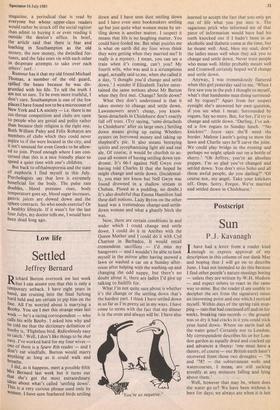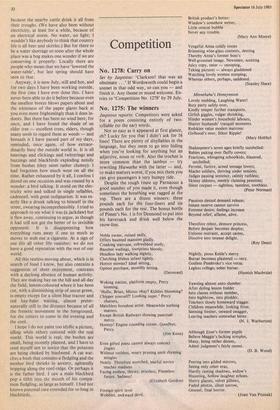Postscript
Sun
P.J. Kavanagh
T have had a letter from a reader kind 1 enough to express approval of my description in this column of our dank May and hoping that I will go on to describe June. I had not intended to do this because I find other people's nature-musings boring
— unless they are written by W.H. Hudson — and expect others to react in the same way to mine. But the reader (I am unable to decipher the sex from the signature) raises an interesting point and one which I noticed myself. Within days of the spring rain stop- ping — rain that had continued off and on for weeks, breaking rain-records — the ground was so dry it had cracks in it you could stick your hand down. Where on earth had all the water gone? Certainly not to London. My correspondent describes his or her Lon- don garden as equally dried and cracked up and advances a theory: `one must have a theory, of course — our British earth hasn't recovered from those two droughts — '76 and '78? — the subterranean wells and watercourses, I mean‘ are still sucking greedily at any moisture failing and lying above them.'
Well, however that may be, where does the water go to? We have been without it here for days; we always are when it is hot because the nearby cattle drink it all from their troughs. (We have also been without electricity, at least for a while, because of an electrical storm. No water, no light; I wouldn't like anybody to think that country life is all beer and skittles.) But for there to be a water shortage so soon after the whole place was a bog makes one wonder if we are conserving it properly. Locally there are people who moan that we have 'lowered the water-table', but last spring should have seen to that.
Anyway, it is now July, still and hot, and for two days I have been working outside, the first time I have ever done this. I have never been able to do it before because even the smallest breeze blows papers about and the whiteness of the paper glares back at you even more frighteningly than it does in- doors. But there has been no wind here, for once, and I have found the shade of an elder tree — excellent trees, elders, though many seerii to regard them as weeds — and beneath it I have passed part of my days, reminded, once again, of how extraor- dinarily busy the outside world is. It is all heavings and clickings and twitterings and buzzings and blackbirds exploding noisily from bushes (they seem rather clumsy). I had forgotten how much went on all the time. Rather exhausted by it all, I confess I dozed on one occasion and was roused by a wonder: a bird talking. It stood on the elec- tricity wire and talked in single syllables, cadenced, 'with great indignation. It was ex- actly like a drunk talking to himself in the street, swearing incomprehensibly. I tried to approach to see what it was (a jackdaw) but it flew away, continuing to argue, as though it had still not got the better of its invisible opponent. It is disappointing how everything runs away if one so much as moves to stub out a cigarette. At a sign of our life all other life vanishes: we do not have a good reputation with the rest of our world.
All this restless moving about, which is in search of food I know, but also contains a suggestion of sheer enjoyment, contrasts with a daylong absence of human activity. They are making hay on the hill and all day the field, lemon-coloured where it has been cut, with a diminishing strip of uncut green, is empty except for a silent blue tractor and red hay-baler waiting, almost preter- naturally stilt in the distance because of all the frenetic movement in the foreground, for the cutters to come in the evening and the cool.
I hope I do not paint too idyllic a picture, idling while others contend with the real world. This world is real; the bushes are small, being recently planted, and I have to steel myself not to notice that the potatoes are being choked by bindweed. A cat wat- ches a bush that contains a fledgling and the mother bird shrieks in anxiety, agitatedly hopping along the roof-ridge. Or perhaps it is the father bird. I saw a male blackbird pop a titbit into the mouth of his compa- nion fledgling, as large as himself. I had not known paternal care extended for so long in blackbirds.







































 Previous page
Previous page